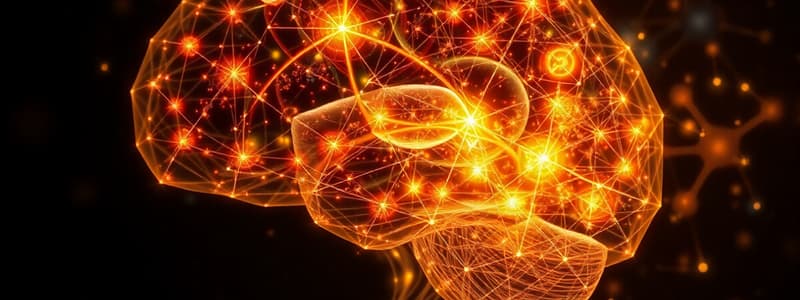Podcast
Questions and Answers
What psychological theory is Titchener most closely associated with?
What psychological theory is Titchener most closely associated with?
- Structuralism (correct)
- Introspection
- Radical behaviorism
- Functionalism
Which of the following concepts is associated with Freud's theory?
Which of the following concepts is associated with Freud's theory?
- Correlation coefficient
- Law of effect
- General intelligence
- Id, ego, superego (correct)
What did Pavlov demonstrate through his experiments?
What did Pavlov demonstrate through his experiments?
- Structuralism
- Operant conditioning
- Cognitive tasks
- Classical conditioning (correct)
Who is known for the development of the law of effect?
Who is known for the development of the law of effect?
What is the main focus of Chomsky's theory?
What is the main focus of Chomsky's theory?
What perspective suggests that knowledge is constructed by the mind and may not reflect reality?
What perspective suggests that knowledge is constructed by the mind and may not reflect reality?
Which philosophical view emphasizes that knowledge is derived from sensory experiences?
Which philosophical view emphasizes that knowledge is derived from sensory experiences?
Who is considered the 'father of modern medicine'?
Who is considered the 'father of modern medicine'?
Which method rejects the significance of mental processes and focuses exclusively on observable behaviors?
Which method rejects the significance of mental processes and focuses exclusively on observable behaviors?
Which philosophical stance holds that scientific methods provide authentic knowledge, dismissing philosophy and religion as inferior?
Which philosophical stance holds that scientific methods provide authentic knowledge, dismissing philosophy and religion as inferior?
What concept suggests that complex phenomena can be understood by breaking them down into simpler components?
What concept suggests that complex phenomena can be understood by breaking them down into simpler components?
Which theory examines the adaptive functions of the human mind in relation to evolutionary principles?
Which theory examines the adaptive functions of the human mind in relation to evolutionary principles?
What philosophical view asserts that true knowledge does not come from observation but rather exists in the world of ideal forms?
What philosophical view asserts that true knowledge does not come from observation but rather exists in the world of ideal forms?
Which philosopher is known for the statement 'I think therefore I am'?
Which philosopher is known for the statement 'I think therefore I am'?
Which idea is associated with Berkeley's philosophy?
Which idea is associated with Berkeley's philosophy?
What concept is Aristotle credited with in relation to the mind?
What concept is Aristotle credited with in relation to the mind?
What did Kant argue regarding knowledge?
What did Kant argue regarding knowledge?
Who developed the heliocentric model of the universe?
Who developed the heliocentric model of the universe?
Which philosopher is referred to as the 'father of empiricism'?
Which philosopher is referred to as the 'father of empiricism'?
What psychological principle did Hume challenge?
What psychological principle did Hume challenge?
What idea is primarily associated with Darwin's theory?
What idea is primarily associated with Darwin's theory?
Flashcards
Rationalism
Rationalism
The idea that knowledge comes from reasoning and logic, and that some knowledge is innate.
Empiricism
Empiricism
The belief that knowledge is gained through sensory experiences and observations.
Positivism
Positivism
The theory that authentic knowledge can only be obtained through the scientific method.
Idealism
Idealism
Signup and view all the flashcards
Realism
Realism
Signup and view all the flashcards
Reductionism
Reductionism
Signup and view all the flashcards
Functionalism
Functionalism
Signup and view all the flashcards
Structuralism
Structuralism
Signup and view all the flashcards
Psychology
Psychology
Signup and view all the flashcards
Hume's Problem of Induction
Hume's Problem of Induction
Signup and view all the flashcards
Kant's Transcendental Idealism
Kant's Transcendental Idealism
Signup and view all the flashcards
Heredity
Heredity
Signup and view all the flashcards
General intelligence (Spearman)
General intelligence (Spearman)
Signup and view all the flashcards
Classical conditioning (Pavlov)
Classical conditioning (Pavlov)
Signup and view all the flashcards
Law of effect (Thorndike)
Law of effect (Thorndike)
Signup and view all the flashcards
Universal grammar (Chomsky)
Universal grammar (Chomsky)
Signup and view all the flashcards
Hebb's rule
Hebb's rule
Signup and view all the flashcards
Study Notes
Dualism
- Mental processes are separate from physical processes.
Rationalism
- Knowledge comes from reason.
- Innate knowledge exists.
- Knowledge is a priori (independent of sensory experience).
Empiricism
- Knowledge comes from sensory experience.
- Tabula rasa: the mind is a blank slate at birth.
- Knowledge is a posteriori (dependent on experience).
Positivism
- Knowledge based on scientific method, not subjective or religious explanations.
Idealism
- Human knowledge constructs the external world.
- Human mind shapes understanding of reality.
Realism
- Knowledge mirrors the external world.
Reductionism
- Complex phenomena reduced to simpler components.
- Neuroscience can explain mental processes.
Functionalism
- Focuses on the practical functions of the mind.
- Examines how mental functions contribute to survival and adaptation in the environment
Structuralism
- Analyzing the structure of the mind into its basic building blocks (components).
- Strives to analyze the elements of consciousness by breaking it down into its fundamental components or elements.
Spiritualism
- Belief in communication with spirits of the dead via mediums.
Behaviourism
- Observable behaviours are crucial to understanding.
- Mental processes irrelevant or unobservable.
Names and their contributions
- Lindberg: importance of written records.
- Hippocrates: Father of Modern medicine.
- Heraclitus: constant change in the world.
- Plato: Rationalism.
Cave (Aristotle's concept)
- Real world is a shadow of perfect forms, not perfect in itself.
Empiricism (Newton)
- Knowledge obtained through observation, some axioms cannot be rejected by observation.
- The heart is the seat of feelings and soul, and brain balances heart's heat.
Descartes
- Dualism: mind and body separate.
- Innate ideas.
- "I think, therefore I am."
Bacon
- Importance of experimentation to gain knowledge
- Correlation between perception and reasoning
Comte
- Progress through three stages: Theological, metaphysical, and scientific/positive.
- Scientific knowledge is always true.
Augustine of Hippo
- Scientific thought and its progression.
Brahamagupta
- Discovered the number 0.
Galilei and Copernicus
- Heliocentric model (sun-centered solar system).
De Groot
- Empirical cycle.
Locke
- Father of empiricism (blank slate).
Berkeley
- Idealism: Reality is fundamentally mental
- Ideas are caused by God, perception is essential
Hume
- Belief in cause and effect is a result of constant observation.
- Problem of induction: past events don't guarantee future events.
Kant
- Empiricism and rationalism integrated.
- Knowledge comes from interaction between experience and mental structures.
Reid
- Common sense realism.
Wolff
- Introduced introspection as a method.
Comte
- Positivism method to critique psychology.
Hooke, Mayer, Weber, Fechner
- Contributors to various aspects of psychology
Darwin
- Natural selection theory
Spencer
- Social Darwinism (survival of the fittest).
Galton
- Individual differences in mental abilities.
- Eugenics.
Quetelet
- Statistical analysis applied to human behavior.
Wundt
- First psychology laboratory.
- Introspection as a method.
James
- Principles of psychology textbook.
- Introspection as a method.
Titchener
- Structuralism (studying the components of the mind).
Freud
- Psychoanalysis (mental health treatment).
- Id, ego, superego (elements of the psyche).
Pearson
- Correlation coefficient.
Spearman
- General intelligence (g).
Thorndike
- Law of effect in learning.
Pavlov
- Classical conditioning.
Skinner
- Radical behaviorism.
Chomsky
- Universal grammar.
- Poverty of stimulus argument.
Galen
- Pig brain experiments, voice originates from the brain.
- Ventricles and their functions.
Vesalius
- Anatomical research.
- Functional division of the brain.
Hebb
- Synaptic connections (cells fire together, wire together).
Luria
- Hierarchical structure of the brain.
- Progressive lateralization.
Studying That Suits You
Use AI to generate personalized quizzes and flashcards to suit your learning preferences.




